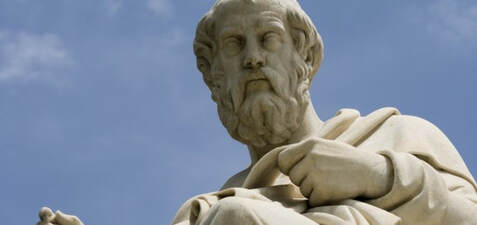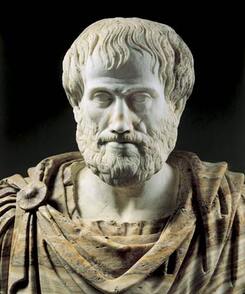Classical Philosophy
Philosophy begins in wonder. And, at the end, when philosophic thought has done its best, the wonder remains.
~Alfred North Whitehead
Why take Classical Philosophy with The Lukeion Project?

We live in a world that increasingly turns to technology to enhance the individual but ends up isolating the person and numbing the mind. People seek political, technological, and medical answers to their biggest questions, but find no solace or peace. We might think that we live in a world that raises new questions all the time, but this is not the case. Most of these questions, in their most basic form, have been asked for millennia. Sadly, thinking deeply about the answers has never been popular among the masses, and today it has been replaced by polarizing memes and belligerent social media posts.
The study of Classical Philosophy is more than just memorizing places, people, and the dates of their writings. It is an exploration of the most important questions posed by the greatest thinkers of their time and how they framed their answers. It is a respectful dialogue between the earliest seekers of wisdom, their successors (both supporters and detractors), and our own age. You will be surprised just how rewarding and enjoyable philosophizing can be! It will enhance your ability to think critically, navigate academic disciplines, perform better in business and political vocations, and solve problems with deep and reflective reasoning.
The early philosophers are not outdated simply because science and technology have advanced. Their questions still challenge us and their complex modes of thinking still astound us. Modern science, politics, math, and more find their foundation in the work of these philosophers. Their forms of logical thinking, eloquent expression, and rhetorical speaking are valuable in all disciplines from the soft sciences of politics, sociology, and psychology to the hard sciences of physics, chemistry, and all forms of STEM. Mastering these philosophical forms and logical formulas, learning to properly engage in honest and disciplined rhetoric, will enhance your future no matter what path you may choose in life.
The study of Classical Philosophy is more than just memorizing places, people, and the dates of their writings. It is an exploration of the most important questions posed by the greatest thinkers of their time and how they framed their answers. It is a respectful dialogue between the earliest seekers of wisdom, their successors (both supporters and detractors), and our own age. You will be surprised just how rewarding and enjoyable philosophizing can be! It will enhance your ability to think critically, navigate academic disciplines, perform better in business and political vocations, and solve problems with deep and reflective reasoning.
The early philosophers are not outdated simply because science and technology have advanced. Their questions still challenge us and their complex modes of thinking still astound us. Modern science, politics, math, and more find their foundation in the work of these philosophers. Their forms of logical thinking, eloquent expression, and rhetorical speaking are valuable in all disciplines from the soft sciences of politics, sociology, and psychology to the hard sciences of physics, chemistry, and all forms of STEM. Mastering these philosophical forms and logical formulas, learning to properly engage in honest and disciplined rhetoric, will enhance your future no matter what path you may choose in life.
On the Study of Philosophy...
No one lives in a vacuum. That is certainly true of philosophers. We will not pretend that these people or their ideas were unaffected by the times in which they lived or the events that took place around them. We will set them firmly in their historical context. At the same time, we will see that many of their ideas transcend their place and their time – and that is the nature of philosophy. They pondered the big ideas and asked the big questions, the ones that many people never stop to consider. We must also remember that the world has progressed since these people walked the earth. We cannot and should not expect them to know what was discovered centuries later, or share the values that we today might hold, based on several additional millennia of experimentation and knowledge. It is not a simple quest to study philosophy, but it is worth the effort.
The point of philosophy is to start with something so simple as not to seem worth stating, and to end with something so paradoxical that no one will believe it.” ~Bertrand Russel
"The unexamined life is not worth living”~Socrates
Classical Philosophy
Recommended age 16+
Philosophy (from the Greek word φιλοσοφία) is variously described as the love of wisdom (a literal translation from its etymology) or the pursuit of knowledge. It is the foundation of all intellectual disciplines today. This class provides a good starting point for fans of S.T.E.M. and debate, or those fascinated by questions about knowledge, values, and reason. Students will read some primary (Classical) literature as well as modern discussions of the major schools and philosophers. Expect discussion board, a semester project, and weekly quizzes or exams. Average time obligation 5-10 hours/week. Students need not complete Classical Philosophy: the Greeks (autumn) before taking Classical Philosophy: the Romans. The courses are independent.
Philosophy (from the Greek word φιλοσοφία) is variously described as the love of wisdom (a literal translation from its etymology) or the pursuit of knowledge. It is the foundation of all intellectual disciplines today. This class provides a good starting point for fans of S.T.E.M. and debate, or those fascinated by questions about knowledge, values, and reason. Students will read some primary (Classical) literature as well as modern discussions of the major schools and philosophers. Expect discussion board, a semester project, and weekly quizzes or exams. Average time obligation 5-10 hours/week. Students need not complete Classical Philosophy: the Greeks (autumn) before taking Classical Philosophy: the Romans. The courses are independent.
To ridicule philosophy is really to philosophize. ~Blaise Pascal, Pensées, 1670
Details

Ancient texts of these philosophers are all available online. Additional resources will also be provided by the instructor. Expectations will be communicated clearly in class in preparation for quizzes or exams. Students should be working at the mid to upper high school level in reading and writing.
Instructor: Regan Barr
Focus during the autumn semester Classical Philosophy: the Greeks
The course will cover the major pre-Socratic philosophers, as well as Socrates, Plato, and Aristotle.
Our text is Classical Philosophy: A history of philosophy without any gaps, Volume 1 - paperback is fine (ISBN-13: 978-0198767039)
Autumn, Thu 11:30 am
Focus during the spring semester Classical Philosophy & Logic: the Romans
The course will cover the major Hellenistic philosophical schools, as well as the major Roman and Early Christan philosophers.
Our text is Philosophy in the Hellenistic and Roman Worlds: A History of philosophy without any gaps, Volume 2 - paperback is fine (ISBN-13: 978-0198818601)
Spring, Thu 11:30 am
Instructor: Regan Barr
Focus during the autumn semester Classical Philosophy: the Greeks
The course will cover the major pre-Socratic philosophers, as well as Socrates, Plato, and Aristotle.
Our text is Classical Philosophy: A history of philosophy without any gaps, Volume 1 - paperback is fine (ISBN-13: 978-0198767039)
Autumn, Thu 11:30 am
Focus during the spring semester Classical Philosophy & Logic: the Romans
The course will cover the major Hellenistic philosophical schools, as well as the major Roman and Early Christan philosophers.
Our text is Philosophy in the Hellenistic and Roman Worlds: A History of philosophy without any gaps, Volume 2 - paperback is fine (ISBN-13: 978-0198818601)
Spring, Thu 11:30 am
What to expect in Classical Philosophy
1. Our live, illustrated sessions will cover the major characters, events, and philosophical constructs/theories from the period being discussed. Mastery of philosophical constructs/theories will outweigh mastery of major characters & events, but you cannot pass the class without mastering both.
2. Required readings will supplement the one-hour live session, but will not always duplicate each other. With that in mind, quizzes and exams can include anything from the class, past quizzes and exams, and required readings. Questions that assess the student’s understanding, effects, and influences, of philosophical constructs/theories are to be expected.
3. Quizzes will be entirely computer graded and have no essay questions.
4. Exam content will be majority computer graded and will test the student’s recognition and understanding of the important facts from the period being discussed. Essay questions and short answer questions to test the student’s recognition and understanding of the important constructs/ theories will be graded by the instructor and not the computer.
5. A semester project will challenge the student to more fully investigate one aspect of Philosophy through the use of scholarly sources, personal analysis, and persuasive presentation
1. Our live, illustrated sessions will cover the major characters, events, and philosophical constructs/theories from the period being discussed. Mastery of philosophical constructs/theories will outweigh mastery of major characters & events, but you cannot pass the class without mastering both.
2. Required readings will supplement the one-hour live session, but will not always duplicate each other. With that in mind, quizzes and exams can include anything from the class, past quizzes and exams, and required readings. Questions that assess the student’s understanding, effects, and influences, of philosophical constructs/theories are to be expected.
3. Quizzes will be entirely computer graded and have no essay questions.
4. Exam content will be majority computer graded and will test the student’s recognition and understanding of the important facts from the period being discussed. Essay questions and short answer questions to test the student’s recognition and understanding of the important constructs/ theories will be graded by the instructor and not the computer.
5. A semester project will challenge the student to more fully investigate one aspect of Philosophy through the use of scholarly sources, personal analysis, and persuasive presentation
What is the first business of philosophy? To part with self-conceit. For it is impossible for anyone to begin to learn what he thinks that he already knows. ~Epictetus, Discourses
